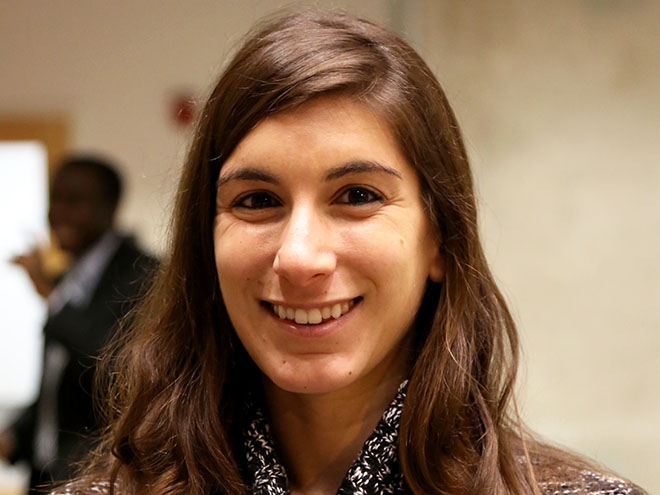
For families that are food insecure — without regular access to affordable, nutritious food — mothers experience a unique stress burden. This is especially true for single mothers, who are twice as likely to be food insecure.
“Mothers are typically the managers of food in the household. They go shopping, they manage the budget, so they take on the stress and responsibility. If they have limited resources, that stress increases,” says Maia Hyary, PhD’20. “Mothers in food-insecure households adopt coping mechanisms to protect their children. They’ll forgo their own medications and eat less healthy food to feed their children first.”
These behaviors, combined with the biological consequences of stress-driven cortisol production, can lead to weight gain and poor health outcomes. Research shows a correlation between food insecurity and obesity in women, particularly mothers.
For her dissertation, Hyary examined two key questions: How does maternal stress affect the relationship between food insecurity and maternal weight? And how does maternal stress affect a child’s likelihood of being food insecure as an adult?
She used a nationally representative longitudinal data set from the Panel Study of Income Dynamics, focusing on stressors such as family disruption, mental and physical health, financial stress, lack of emotional and practical support, and changes to household composition.
She hypothesized that stress would exacerbate weight gain among food-insecure mothers. But she found that particular stressors had the opposite effect: Mothers who became food insecure over a two-year period and whose number of at-home children decreased, possibly as a result of state removal or informal arrangements with family members, lost more weight than mothers with no changes in food security status or at-home children. Another key stressor was falling behind on bills, which made food-insecure mothers less likely to gain a significant amount of weight.
“This study suggests that the correlation between food insecurity and obesity may not be as prevalent among mothers experiencing dire financial conditions. The combination of maternal stress and the inability to purchase sufficient food contributes to significant maternal weight loss,” Hyary says.
She also found a direct relationship between food insecurity in childhood and adulthood. If a food-insecure mother borrowed money from friends or relatives, her children were twice as likely to be food insecure in adulthood as children in food-insecure households whose mothers did not borrow money.
Hyary recommends that policymakers expand two federal benefit programs as children get older and have increased nutritional needs: WIC (Special Supplemental Nutrition Program for Women, Infants and Children) and SNAP (Supplemental Nutrition Assistance Program). Food-insecurity resources should also be widely distributed in pediatric and OB-GYN offices.
During the COVID-19 pandemic, Hyary’s dissertation research and recommendations are particularly relevant. Recent studies from the Urban Institute and Northeastern University show food insecurity has risen as much as double pre-pandemic levels.
In addition, “there’s disproportionate stress for all mothers during the coronavirus pandemic. Mothers are taking on more household chores and child care in addition to working full time, so that increases stress levels, even more so in income-limited households,” she says. “That makes these policy changes more critical than ever.”
